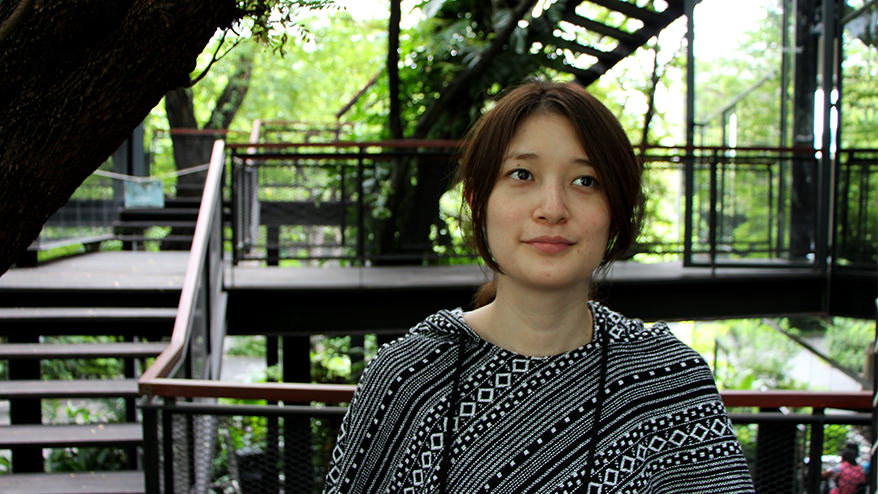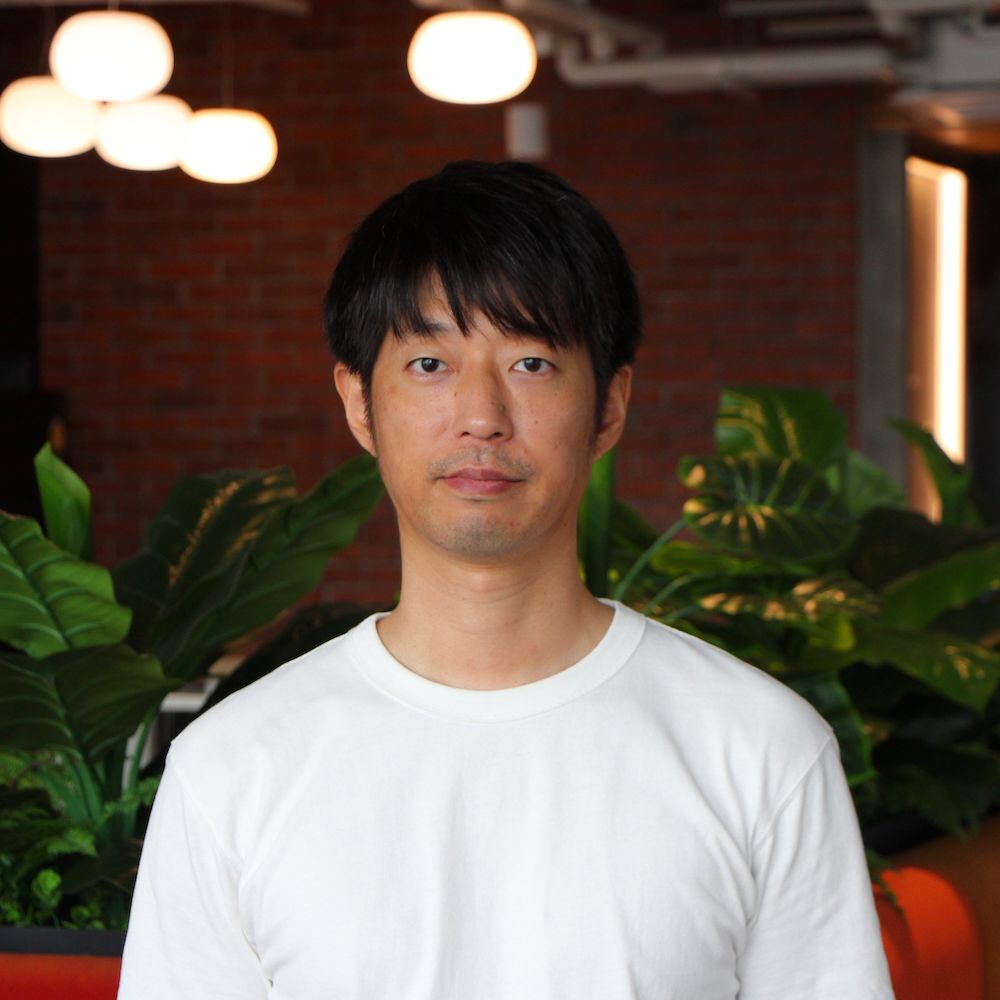Hello. I am Miyagawa, the manager of Monosus Thailand.
Last month, we praised Yurika Machiyama, who belongs to Monosus Thailand, in an article introducing her June MVP award . She moved overseas when she joined the company, but it has been almost two and a half years since she started living abroad for the first time.
I was in charge of Machiyama's recruitment and had been in contact with her for the longest period of time as her supporter in the past. We often went out for drinks after work, so I know Machiyama better than anyone else in the company since she came to Thailand.
Although Machiyama is now used to Thailand and has been praised for his work, he was 26 years old when he was hired and had no experience in the web industry. He had only traveled abroad once before, had never been to Southeast Asia, and it was his first time living alone. Normally, this would have been the furthest thing from his current environment. And yet, that's exactly why he wanted to join the company.
This time, we would like to explore the values that underlie Machiyama's everyday work style.
Before deciding to go to Thailand
My first contact with Machiyama in Thailand was at Suvarnabhumi Airport, right after he arrived in Bangkok to look for an apartment. He looked sleepy when he arrived. I greeted him in the arrival lobby and held out my hand to help him hold his suitcase, saying "Welcome." But for some reason, Machiyama instinctively put his fist on me!
I realized that he had mistaken me for a high-five (the one Manager Hara uses), and we immediately became friendly when we met, but that was the moment I realized that as long as I could keep up that vibe, I would be able to do just fine in my first time living abroad.
With the help of a friend, I tried my hand at HTML.
When he was hired, Machiyama's application email included a link to a web page. Among the 44 applicants, he was the only one who had created his own self-introduction page using HTML/CSS.
This page gave me the sense that rather than just doing something because they are told to or waiting to be taught, they should take the initiative and put things into practice as the people involved.
Machiyama was born and raised in Tokyo, went to an excellent high school, and entered a mass media department at a university that produces female announcers. Because she is a subcultural character, she struggled with the gap between her and the other girls at university. After that, she decided to do what she loved, and went on to a vocational school to study architectural spatial design. Then, because she loved stylish buildings, she wanted to improve the working environment in Japan, so she became an office real estate salesman.
Although he enjoyed working in real estate, as he was approaching the latter half of his 20s, Machiyama began to feel dissatisfied with the sense of daily growth and the feeling that he had not yet accomplished anything. He also seemed to feel anxious about continuing to live in Tokyo after the Great East Japan Earthquake. While searching for a place to move to and a new job that would not tie him down to a place of residence, he came across an ad for Monosus to go to Thailand .
"I had never thought of that," he said, explaining that the reason he wanted to transfer to Thailand was because "I had never wanted to go there before."
While searching for a new way of life, he suddenly realized that he was only seeing what he wanted to see and narrowing his values. "I want to broaden the scope of my life. A mundane life is boring. I thought that if I went to an unknown place, I would be able to gain new perspectives and ideas that I had never had before."
Attracted by the keyword "Thailand" in the search box in his head, a keyword he would probably never have typed in his life, Machiyama decided to change jobs.
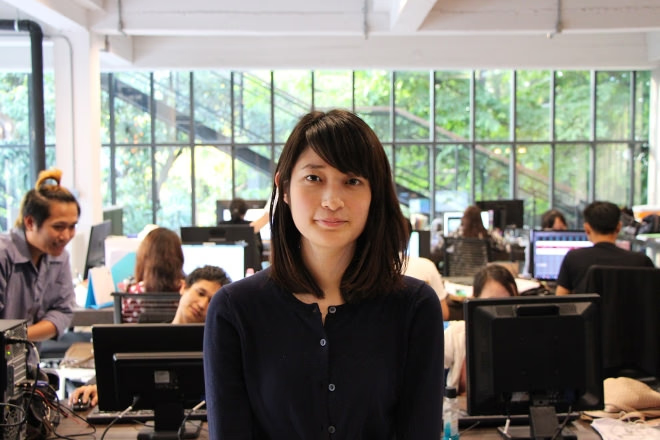
Machiyama when he first joined the company. Still a newbie.
Yurika Machiyama's work
Since joining the company, Machiyama has been a perfect attendance award winner, without a single sick day. He started with no experience, and after his training and debut on a project, he continued to correct my emails for eight months. However, he was not discouraged by the strict training, and before I knew it, he had gone beyond being a full-fledged employee and become an ace.
He is highly trusted by clients and in-house coders. He organizes client requests in an easy-to-understand way and carefully explains them to the coders. He thoroughly examines all points of doubt, researches until he understands, and confirms until he is satisfied. He tests for himself whether something is really possible or not, and does not jump to conclusions easily. He has been able to solve many of the problems that have befallen him one after another by researching them himself, leading projects to success.
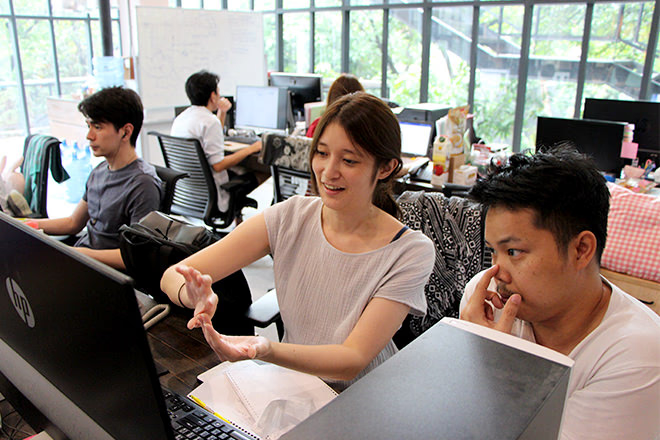
Machiyama explains to the coder in both English and Thai, using gestures as well.
Although Machiyama's usual character gives the impression of being free-spirited, he was actually the student council president when he was in elementary school, the captain of the basketball club in middle school, and the vice-leader of the cheerleading squad in high school, and has demonstrated leadership in many ways.
According to him, he does have a free-spirited side, and doesn't like to be restricted too much. He doesn't want to take on leadership roles if someone else does. He would prefer to be the second in command, and doesn't want to be at the top. However, he accepts when asked, and seems to be the type of person who wants to meet expectations.
Since his debut two years ago, Machiyama has been working later than anyone else and contributing to the project to the fullest extent. There have been many times when I have worried about his health. Nevertheless, due to the shortage of directors and because Machiyama always gets the job done, the projects are concentrated in Machiyama's hands.
That sense of responsibility sometimes ends up attracting an overwhelming workload, but once they have taken on a task, they are reliable enough to give it their all, which in turn attracts even more work.
Apart from the fact that it is physically tough, I have never heard any negative comments from Machiyama. Where did he acquire such a stoic attitude towards his work?
The origins of Yurika Machiyama
Among the topics Machiyama talked about during the interview, the one that made the biggest impression on me was the story of his teacher from elementary school. He was his homeroom teacher for the fifth and sixth grades, and was very strict, but he said, "I learned a lot from him, and that's what has shaped my values today." He didn't directly teach students the right answers, but was very good at helping them "realize things, think for themselves, and act on them."
For example, the perfect score for a math test was not 100 points, but rather points were added if students wrote about the strategies they used to arrive at the answer. During Japanese reading time, the rule was that students could keep reading as long as they didn't stumble, and there was a system in place that encouraged students to take the initiative and raise their hands as if it were a game.
He also said that through his research experiences during extracurricular activities, he naturally learned not to blindly accept what is written in textbooks or what is considered common sense in society, but to think he understands something until he has researched and analyzed it himself.
The event that has stayed with Machiyama the most was the independent study project he did during summer vacation in sixth grade.
The teacher said, "If you write a report about fossil collecting, I will take you to collect fossils." You are free to do it or not. However, only those who want to go can do it. Machiyama immediately thought to himself, "I will definitely do it...!"
However, when he actually started, he found it to be a higher hurdle than he had expected for an elementary school student, and he almost gave up. However, given the freedom to "do it or not," Machiyama felt the meaning in completing it of his own volition, not because he had to. It would be easy to give up, but he intuitively felt that "this experience will definitely be beneficial."
In the end, most of the students did not write their reports, but Machiyama did not give up and worked hard to complete them, and as promised, he was taken on his long-awaited fossil collecting trip.
From this experience, Machiyama learned that "Only those who do it can pave the way" and "Whether to do it or not is entirely up to you." It seems that he acquired the mindset of "practice makes perfect" and "the spirit of giving it a try."
As she still reflects, "If I hadn't written that report, I don't think I would be the Machiyama I am today," and it can be said that this is the origin of her approach to things.
Don't worry about the details
Even Machiyama can be rather careless and absent-minded when it comes to things outside of work.
She thinks that "squid ink" and "Chinese ink" are the same thing (is this a matter of knowledge?), and she still mistakenly calls the shopping mall that opened nearby, "Summer Hill," "Sunny Hills." It's rare that she can correctly say the title of a movie or the name of a celebrity on the first try. It's frustrating that she can't remember the more embarrassing mistakes she's made, but talking to her will give everyone a good laugh, as there will be plenty of things to poke fun at.
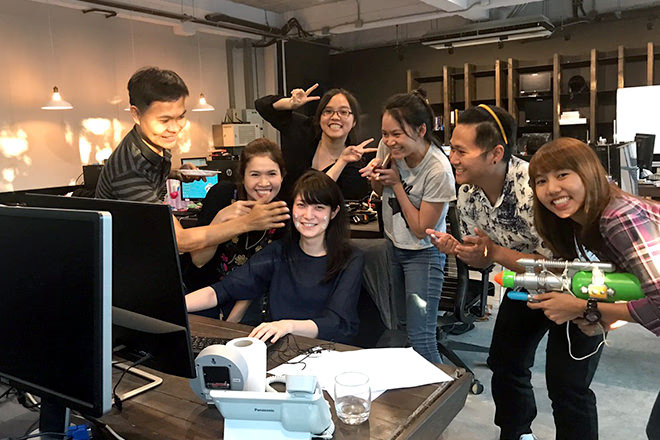
This photo was taken on the day before Songkran, the Lunar New Year, which is famous for its water-throwing festival. Machiyama has his face smeared with the famous white powder called Din So Phong.
Challenges to a fulfilling life in Thailand
Machiyama is fundamentally serious and tends to worry about work, and about 80% of the conversation when he goes out drinking is about work, and his strong sense of responsibility doesn't fade even when he's away from the office.
However, unlike at work, it is precious to have time to talk about anything frankly, regardless of position, on the same level. I think it is because of this time that we have been able to encourage each other, even when we complain, and share our thoughts with each other, that we have been able to get by so far.
When his work is too busy during the weekdays, Machiyama stays home on the weekends to immerse himself in his favorite manga, anime and reading, but he is also active on his days off. When he finds an interesting event, his eyes light up and he heads out. He is also actively trying to make foreign friends, and because he can't speak much English, he makes an effort to interact with them in order to speak. Machiyama naturally adapted to the living environment in Thailand and can accept diverse values, so he will likely get along well with people of any race.
She used to be taking English conversation lessons and dance lessons, but she complains that her days are still so busy that she only has weekends to take a break from everything, and as her manager, it makes me sad.
While I'm grateful for him working hard every night, it seems I'll continue to worry about how to make Machiyama's after-6 hours and weekends more fulfilling.
